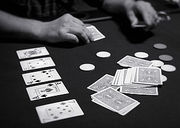Play Texas Holdem For Fun
Play Texas Holdem Just For Fun
Texas hold 'em (also known as hold'em or holdem) is a different standard card game of poker. The game consists of two cards being dealt face down to each player and then five community cards being placed by the dealer—a series of three ("the flop") then two additional single cards ("the turn" and "the river"), with players having the option to check, bet or fold after each deal, i.e. betting may occur prior to the flop, "on the flop," "on the turn," and "on the river."
In Texas hold 'em, like all variants of poker, individuals compete for an amount of money or chips contributed by the players themselves (called the pot). Because the cards are dealt randomly and outside the control of the players, each player attempts to control the amount of money in the pot based on the hand the player holds.
The game is divided into a series of hands or deals; at the conclusion of each hand, the pot is typically awarded to one player (an exception in which the pot is divided between more than one is discussed below). A hand may end at the showdown, in which case the remaining players compare their hands and the highest hand is awarded the pot; that highest hand is usually held by only one player, but can be held by more in the case of a tie. The other possibility for the conclusion of a hand is when all but one player have folded and have thereby abandoned any claim to the pot, in which case the pot is awarded to the player who has not folded.
The objective of winning players is not winning every individual hand, but rather making mathematically and psychologically correct decisions regarding when and how much to bet, raise, call or fold. By making such decisions, winning poker players maximize long-term winnings by maximizing their expected gain on each round of betting.
In Texas hold 'em, like all variants of poker, individuals compete for an amount of money or chips contributed by the players themselves (called the pot). Because the cards are dealt randomly and outside the control of the players, each player attempts to control the amount of money in the pot based on the hand the player holds.
The game is divided into a series of hands or deals; at the conclusion of each hand, the pot is typically awarded to one player (an exception in which the pot is divided between more than one is discussed below). A hand may end at the showdown, in which case the remaining players compare their hands and the highest hand is awarded the pot; that highest hand is usually held by only one player, but can be held by more in the case of a tie. The other possibility for the conclusion of a hand is when all but one player have folded and have thereby abandoned any claim to the pot, in which case the pot is awarded to the player who has not folded.
The objective of winning players is not winning every individual hand, but rather making mathematically and psychologically correct decisions regarding when and how much to bet, raise, call or fold. By making such decisions, winning poker players maximize long-term winnings by maximizing their expected gain on each round of betting.
